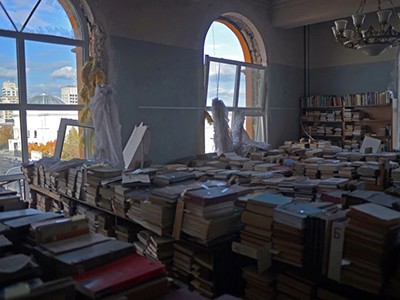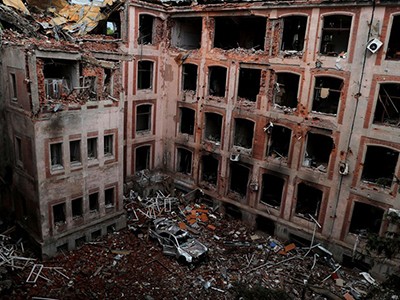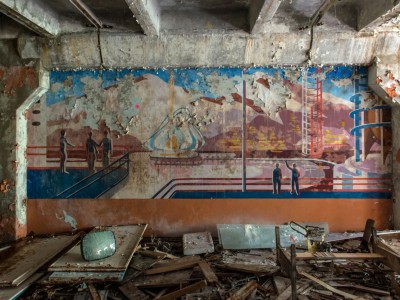A year into Russia’s war on Ukraine, Kseniia Minakova is rebuilding her research laboratory and her career.
Minakova, a 34-year-old physicist in Kharkiv, remained in Ukraine when Russia invaded last February. Despite the crisis, on 19 August, she was buoyed by clinching a collaboration with US scientists on solar-energy research. But that same night brought disaster. A Russian missile hit her campus, killing a guard and destroying her optics and photonics laboratory, at the National Technical University Kharkiv Polytechnic Institute.
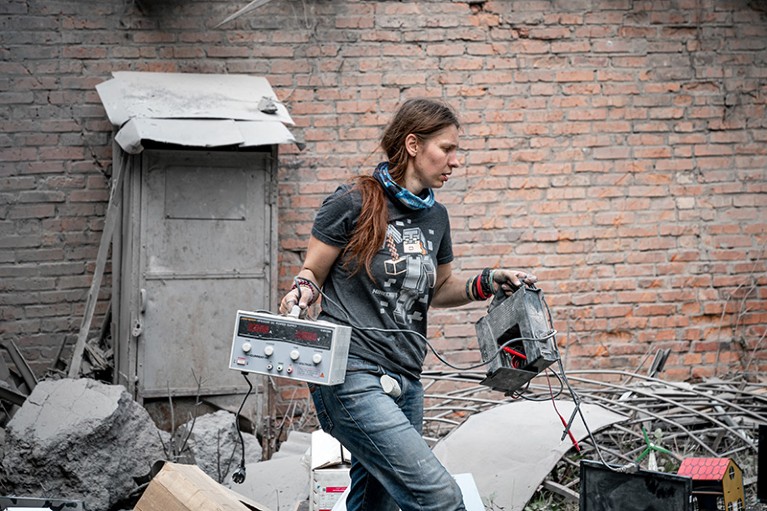
Kseniia Minakova salvaged equipment from the rubble of her laboratory. Credit: Vasyl Holosniy
Minakova and her colleagues salvaged microscopes, welding equipment and computers from the rubble and moved into a smaller space nearby. Her US partners at Tulane University in New Orleans, Louisiana — one of whom, Denys Bondar, is Ukrainian-born — sent a support package, including solar cells, a thermal imaging camera and other equipment to Kharkiv. Minakova now has a lab space one- quarter the size of what she lost, but the joint work with Tulane, part of a wider collaboration between the two universities, is under way.
Despite daily, three-hour power outages and frequent air-raid alarms, Minakova is continuing her research into high-efficiency solar cells, and she hopes to visit Tulane for training later this year. She delivers lectures and lab-demonstration classes online to her undergraduate students, who aren’t allowed on Kharkiv’s campus for safety reasons. In her spare time, she volunteers to help older residents find water and medicine, and helps children to embroider goodwill tokens for soldiers. “The best idea for living is to have no free time,” she says.
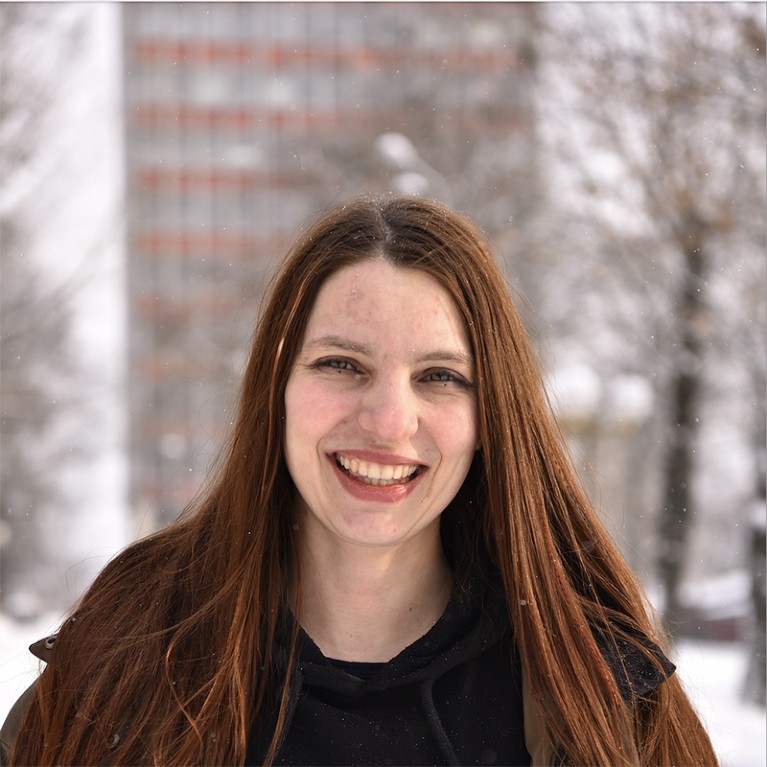
Kseniia Minakova in 2021, before the war.Credit: Valery Tayemnytskyi
Minakova is one of tens of thousands of scientists in Ukraine striving to keep their research going as their country enters a second year of resisting Russia’s aggression.
Most of the country’s researchers — who totalled 60,000 before the war, with some 35,000 scientific support staff — have remained in Ukraine. Estimates of the number who have left vary widely, but the Ministry of Education and Science of Ukraine thinks some 6,000 scientists are currently out of the country because of the war. Of those still in Ukraine, some have chosen to fight on the front line — and some have died there; others have lost family members. Many are internally displaced because their workplace is damaged, destroyed or impossible to operate in owing to a lack of power. Some have lost jobs, project funds or a proportion of their salary, as money is repurposed for the war effort.
As of January, 91 research and higher education institutes had been damaged; with 4 totally destroyed, according to the science ministry. Some 228 remain unharmed. The renowned Kharkiv Institute of Physics and Technology and the world’s largest decametre-wavelength radio telescope, which belongs to the Institute of Radio Astronomy in Kharkiv, were heavily damaged.
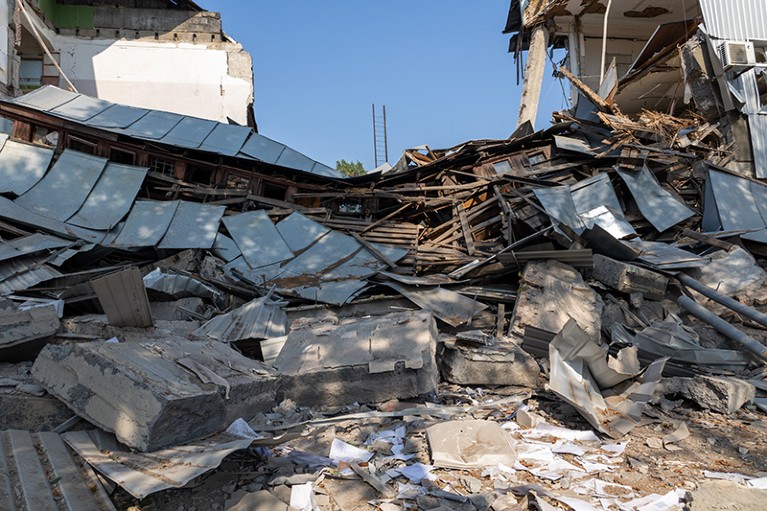
The National Technical University Kharkiv Polytechnic Institute, after buildings on campus were hit by a Russian missile in August.Credit: Sofiia Bobok/Anadolu Agency via Getty
In December last year, the National Academy of Sciences of Ukraine accused Russia of “purposefully destroying science in Ukraine as a profession”, an act it called “scienticide”.
Science in Ukraine is “bleeding”, says Igor Komarov, a 58-year-old organic chemist and the director of the Institute of High Technologies at the Taras Shevchenko National University of Kyiv. Many of the scientists who remain, however, are determined to toil on against the odds. And increasingly, the international community is finding ways to help.
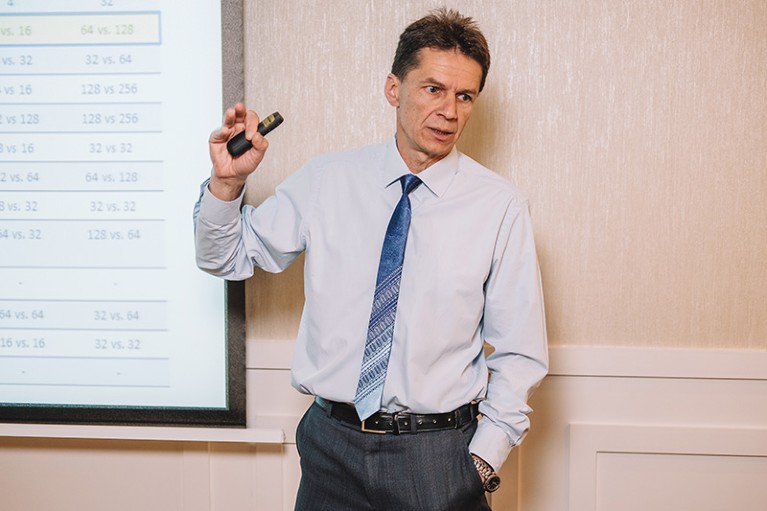
Organic chemist Igor Komarov says science in Ukraine is “bleeding”.Credit: Igor V. Komarov
Although foreign institutions have been offering support to Ukrainian scientists who have left the country since the early days of the invasion, they are now tailoring that help so that these scientists can maintain their ties with institutions at home. The foreign institutions are also increasingly targeting funds towards researchers inside the country — for salaries, equipment and infrastructure repairs, as well as for virtual collaboration efforts. In the middle of the tragedies of lost lives, bombed buildings and thwarted careers, many Ukrainian scientists are forging collaborations with institutions outside the country that, some think, are laying a strong foundation for a thriving, Western-facing scientific community after the war.
Rolling blackouts
Ukraine has dealt with Russia’s unrelenting destruction of energy infrastructure by putting the country on a schedule of rolling blackouts. Water supply and heating are also subject to regular disruption. Generators and fuel are hard to come by. As a result, universities and research institutes have to plan elaborate schedules for experiments and online teaching, because students in different places don’t always have electricity at the same time.
As Russia continues to bomb the country, the other regular, but less predictable, interruptions are air-raid sirens, which typically give a 30–60 minute warning to move to safety, says Komarov. “Each man and woman has found a way to cope,” he says. “I just keep working, working and working even if things go wrong.”
Komarov, who heads a staff of 60 overseeing 500 undergraduates, says the first month of the war was particularly hard, and dominated by struggles to source even basic reagents. A low point was New Year’s Eve, when Russia bombed his university, shattering more than 1,000 windows that needed to be boarded up before temperatures plunged.
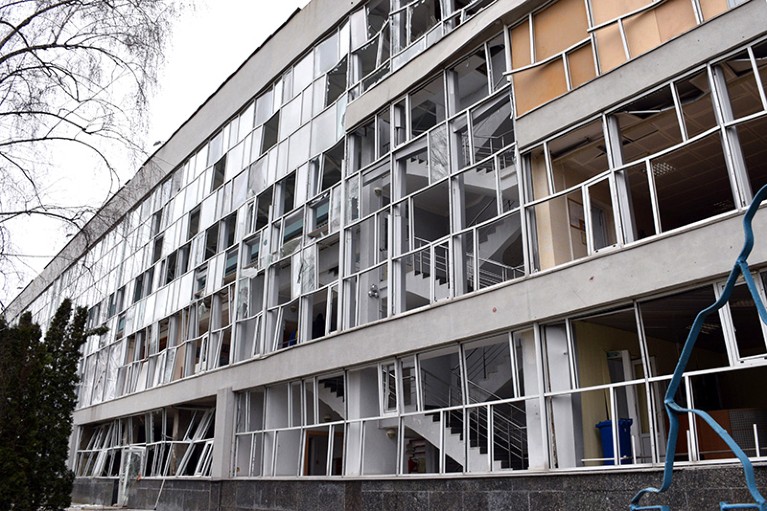
The Taras Shevchenko National University of Kyiv was damaged by bombing.Credit: Taras Shevchenko National University
“Most of my time and that of my colleagues — the deans and directors — is spent on adjusting the working schedule to the power cut-offs and alarms, and organizing logistics, especially for reagents coming from abroad,” he says. In his spare time, Komarov raises funds for the war effort and works on proposals for the construction of a new biomedical science hub when the war is over.
Rebuilding Ukrainian science can’t wait — here’s how to start
“I make a major effort to continue doing science. It’s difficult not only physically but also because of this psychological pressure. To do something creative you need a peaceful time. Even writing papers became quite a challenge.”
Since the war began, his university has lost about one-fifth of its undergraduate and PhD students, says Komarov, who worries about brain drain. (The loss of students is also affecting his university’s funding). “There is a great shortage of scientists here in Ukraine now.” Half of his staff and students are displaced within Ukraine, but are still working; some university staff, he adds, have gone to battlefields, where some have died.
Help for researchers in Ukraine
Last year, Olga Polotska, who heads the National Research Foundation of Ukraine (NRFU), a grant-giving body set up in 2018, was looking forward to giving out her agency’s largest ever funding total, 27 million (US$29 million), double that of the previous year, in project grants. But shortly after the invasion, the government decided to redirect those funds to help fight the war. Now, the NRFU is starting to honour its 2022 commitments. Polotska had initially focused her efforts on drumming up international support for Ukrainian researchers abroad. “But the time came, in early summer, when I told myself I should focus on those who are remaining,” she says. “We need these people,” she adds. “Scientists are the golden resource.”
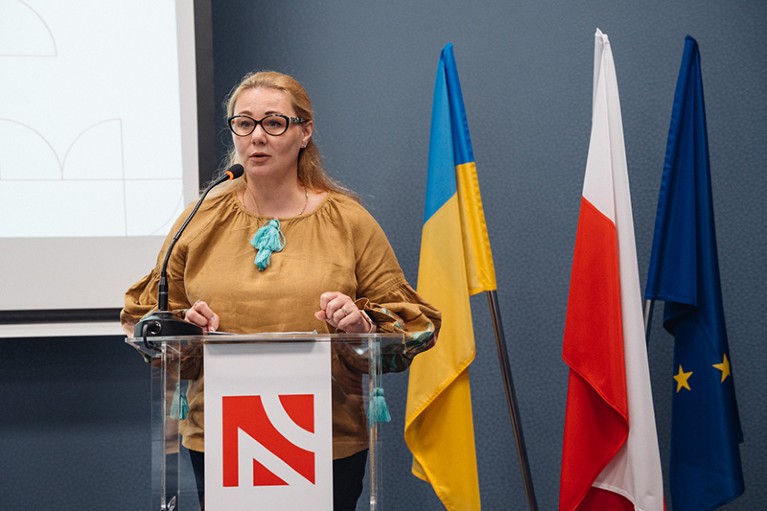
Olga Polotska, who heads the National Research Foundation of Ukraine, speaking at an event where Polish government research funder NCN presented support schemes for Ukrainian researchers.Credit: Jan Bielecki for the NCN
A number of international aid schemes now do support scientists in Ukraine. In June 2022, the Swiss National Science Foundation in Bern extended a scheme supporting Ukrainian scientists who have fled to Switzerland, to allow remote funding for projects in Ukraine, between teams from the two countries. And the Dutch Research Council (NWO) is discussing a €250,000 scheme under which Ukrainian researchers can remotely join existing NWO-financed projects. Last December, the University of Cambridge, UK, and the NRFU launched a scheme under which the university will fund up to 15 grants for individual researchers from Ukraine who have been displaced by the war and are still living in Ukraine.
“To my mind it’s perfect,” says Polotska, “to provide grant support to researchers staying in Ukraine from the regions that have been severely affected by the military aggression.”
In January, the Simons Foundation in New York City, which supports research in mathematics and basic science, announced more than $1.2 million of funding for 405 scientists in Ukraine, including doctoral candidates. Each will receive a $100 or $200 monthly stipend with some leaders of research teams receiving larger, lump sums.
Ukraine’s scientists need help to rebuild their research system
“The main point [of focusing grants into the country] is to assure that the scientists who are in Ukraine, can still remain scientists. So that when the war eventually finishes, they have not left academia altogether and not lost contact with the international scientific community,” says Michael Rose, who studies the economics of science and innovation at the Max Planck Institute for Innovation and Competition in Munich, Germany.
Rose is a co-founder of #ScienceForUkraine (SfU), a virtual international network of researchers and students. SfU first focused its efforts on coordinating positions for scientists who had left Ukraine, but it is now also looking to support researchers who have remained in the country. Last September, it established — along with the global initiative Economists for Ukraine — a programme to award 70 stipends, each worth $5,000, to scientists in Ukraine. The award includes networking and engagement with host institutions, which are mostly US universities.
SfU is also experimenting with a website on which more than 80 Ukrainian research institutes have posted requests to the international community. These range from fire extinguishers to internships, although Rose says responses to the requests have been disappointing so far.
Komarov thinks that international support should focus on helping Ukrainians to keep up their research and teaching within the country. Such programmes “will help us to survive to restore the scientific infrastructure after the war”, he says.
Deepening connections
Polotska says support doesn’t have to be financial. “There have been so many bottom-up initiatives, for example organizing workshops on grant management. One of the key psychological difficulties that people are experiencing is lack of communication, lack of access to the international community.”
Young academics, such as Ivan Brusak, a 28-year-old specialist in geodesy at Lviv Polytechnic National University in Ukraine, say they need equipment and remote international collaborations.
Brusak took months off work when the war began, helping to organize student support for the war effort. His team coordinated a giant weaving operation conducted at more than 100 venues around Lviv, turning tonnes of fabrics and threads into camouflage nets. It also procured and delivered kit such as binoculars and thermal imaging cameras to the military.
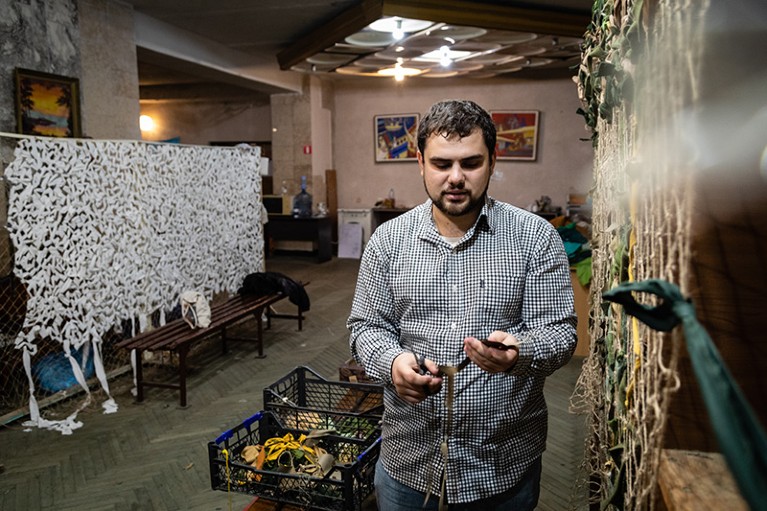
Geodesy specialist Ivan Brusak wove camouflage nets for the war effort in 2022.Credit: Katya Moskalyuk/Global Images Ukraine via Getty
Brusak would volunteer from 8 a.m. to 8 p.m., writing scientific papers in the evenings. “Frankly, I still don’t understand how I managed it,” he says. By summer, his time volunteering had dropped and he successfully defended his thesis in December.
His work now takes him about three times as long as it usually would, he says. “I feel constant fatigue from the war around me and the deaths of people I know, which diverts the focus from science.” But, he adds, “my colleagues from Ukraine and I are not going to give up. We are waiting for victory in the war”.
He values a collaboration he has with Polish scientists that began last July. “The understanding that despite the war we continue to cooperate gives motivation.”
Ukrainian scientists abroad
Meanwhile, numerous universities and international collaborations have offered a range of support including spare office space, fellowships and jobs, to help the thousands (or possibly tens of thousands) of scientists who have left Ukraine. Rose says that Poland and Germany have taken in the largest number of scientists, but there are also many in France, Spain and Italy and smaller numbers in the United Kingdom and the United States. One of the largest support schemes was the European Union’s 25 million MSCA4Ukraine, which offered temporary placements for doctoral and postdoc students under its Marie Skłodowska-Curie Actions programme.
Rose says that SfU alone has helped about 1,000 scientists find positions outside Ukraine, with about 10 new opportunities still emerging each week.
Scientists in Ukraine have long fought for scientific freedom
Last December, Polish and Ukrainian scientists working with SfU and other institutions released a survey of more than 600 Ukrainian scientists who left their country after the invasion (see go.nature.com/3k3zdpy). The organizers reached as many respondents as they could with the help of networks such as SfU, but say that they probably missed scientists who are not linked to these groups. Still, the results suggest that those outside Ukraine are mostly women (largely because it’s harder for men to leave: those aged 18–60 are not supposed to leave the country, although special dispensation can be granted, such as to single parents). The majority are senior researchers, and many have children with them.
Their relationship with their home institutions in Ukraine is varied.
“We have seen that researchers don’t want to abandon their Ukrainian employment,” says Iryna Degtyarova, a co-author of the survey report. She works at the SGH Warsaw School of Economics, Poland, in a role created since the war began, building links between the school and Ukrainian universities. “They are not typical refugees who have burned their bridges. It makes a huge difference that the threat is not from within their country: they have a completely different mindset.”
The survey found that around one-third were continuing their work in Ukraine remotely. But 30% reported that there were tensions with some home institutions, for example because the institution had told absent teaching staff to return or lose their jobs. And although 42% said they would return to Ukraine if the war ended within a few months, equal proportions of the remainder said they would not return or didn’t know what they would do.
The important thing, says Degtyarova, is to keep Ukrainians abroad connected to their work back home.
For some, ties have already loosened. Olena Prysiazhna, a 35-year-old specialist in plasma physics who was at the National University of Kyiv, has left Ukrainian science — at least for now — after her Kyiv contract lapsed when she couldn’t get back in time to renew it. She had fled with her mother, younger sister (a physics postgraduate student) and their dog, after a missile landed in their neighbour’s back garden. When Nature spoke to Prysiazhna last April (see Nature 605, 414–416; 2022), the family was in the Netherlands recovering from the ordeal, and both sisters were looking for scientific work.
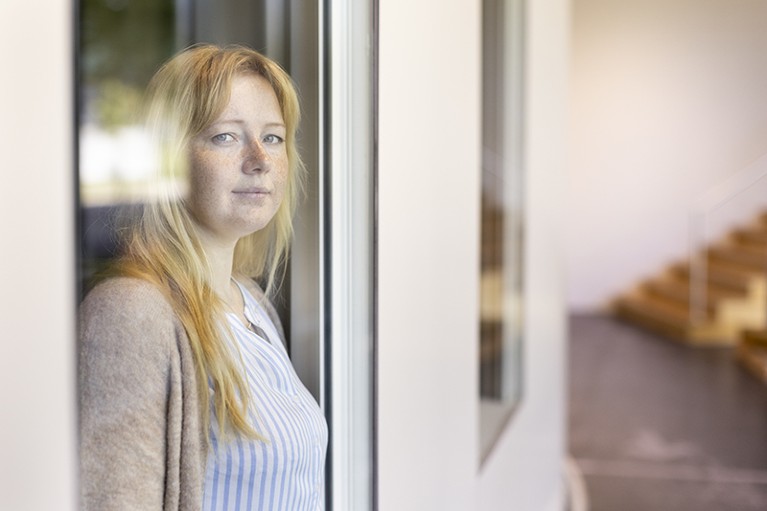
Plasma physicist Olena Prysiazhna left Ukraine and is now working in Japan.Credit: Ilvy Njiokiktjien/VII Photo
Now, through a contact she had previously made at a conference, Prysiazhna has a part-time job at Sojo University in Kumamoto, Japan, in a different field of plasma physics. “It’s hard to be alone,” she says, saying that she checks Facebook every morning to make sure her old friends and colleagues in Ukraine are still alive. “But war has changed me. You become more brave and resilient,” she says. “If someone had told me a year ago I would go to Japan on my own I would not have believed them. But I had no fear.”
Prysiazhna assumes she will eventually return to Ukraine, although her family’s home is damaged, as her mother found on a brief return visit. Prysiazhna’s mother and sister, and the dog, now share a room in a converted holiday camp in the Netherlands. Her sister, who had almost finished her PhD when she left Ukraine, is trying to find a way to defend her thesis and is working for a logistics company.
Komarov’s worry is that scientists in Prysiazhna’s position — young and with few ties — might never return. But Rose, who studies phenomena such as brain drain, disagrees.
“Irrespective of whether people are refugees, irrespective of whether they return or not,” he says, “these fears of brain drain are not substantiated. Most people return and then they bring new ideas back. But even when they don’t return, they still pass on knowledge and insight to people who are still there. Even this way there is knowledge sharing.”
Whether the aid is inside or outside the country, Rose, Bondar and others are convinced that, out of the horrors of the Russian invasion, there could emerge a web of connections with Western science that will help Ukraine — if it wins the war — to rebuild and reform its science, and build a future more closely allied with Europe.
Komarov and Minakova both want to keep Ukrainian science strong now, so that the research community can make rapid gains when the war ends. Minakova sees her research as crucial to this effort. Her team and Bondar’s have just won a grant from the US Embassy in Kyiv to fund the education of master’s students in the science, technology, policy and business of solar power.
“The war will stop and then we will need to be good specialists in alternative energy,” she says. “We are going to rebuild our country and our campuses and I hope the world will help us.”


